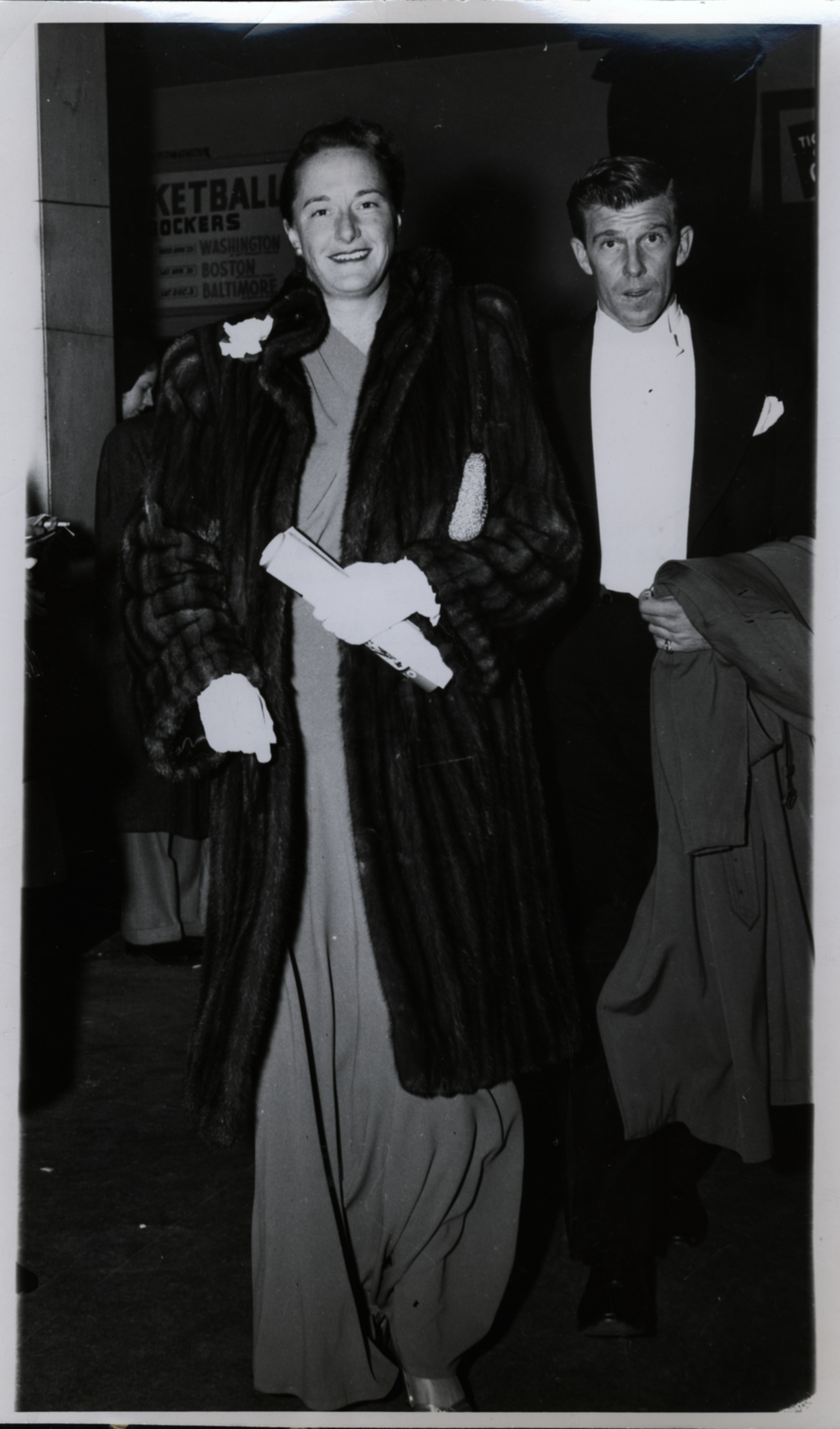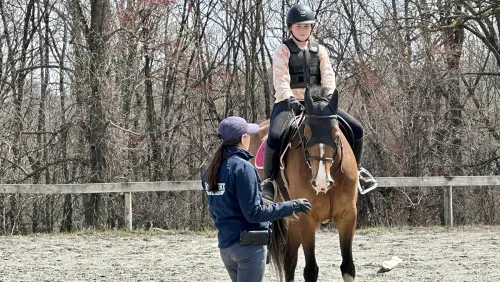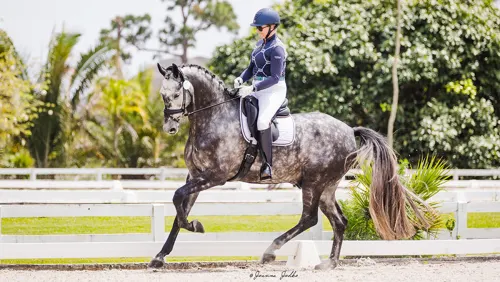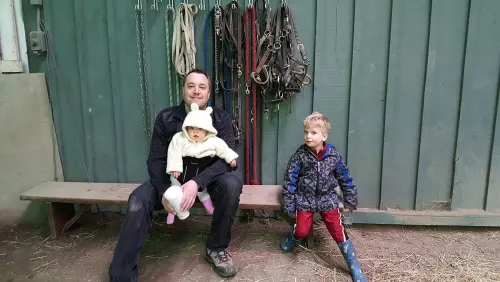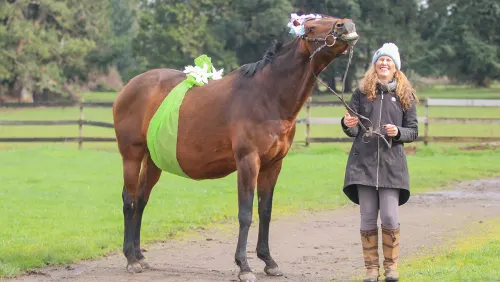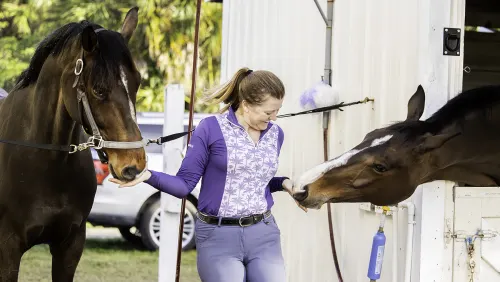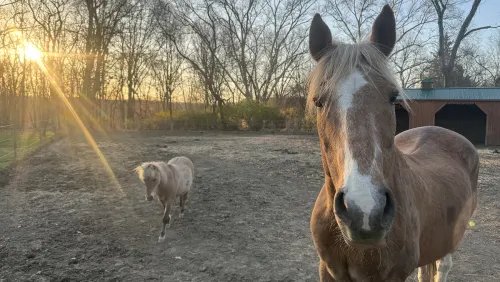“Horses and I have always understood each other,” said Sallie Sexton in a 1996 Chronicle interview. “Which is why I can still take the youngsters in the ring and stand them up. I only shake my bat at them and tell them to behave, and they listen. I listen to them too–we communicate with each other.”
Sexton was born in 1912 on her parents’ Bryn Du Farm, a vast cattle property in Granville, Ohio. She grew up riding the ponies from her father’s mines. While most mine ponies were kept underground at the time, where they eventually went blind, Sexton’s father kept his above ground and brought the best ones home for Sexton.
“My mother, unfortunately, had a vision of me in a basket cart with my governess driving a dear little flaxen-maned pony,” Sexton said with a smile. “This never did work out, of course, because I was too busy getting bucked off these rank animals trying to break them!”
At 14, Sexton left for boarding school at Rosemary Hall in Connecticut, where horses became an integral part of her life. She rode on the school team and helped the schoolmistress work her horse, Christmas Morning, who evidently was a devil.
When Sexton finished her schooling, her father made a deal with her that would change her life. He told her that if she went to college and concentrated on school instead of horses, she could have all the horses she wanted, within reason, after she graduated. She graduated from Bryn Mawr (Pa.) summa cum laude, though it was hard for her to stay away from the horses in the heart of Radnor hunt country.
Sexton was offered a job with Time magazine after graduation, but at that point in her life, both of her parents had passed away, and she missed the farm. She returned to Bryn Du in order to manage the family’s cattle operation and to collect on her bet and start buying nice horses.
She adored jumping and taught herself by practicing with the mine ponies over a fallen tree in the woods. She started where the branches were low on the ground and then worked her way higher and higher as her courage grew.
“History does not relate what my form was in those days, and no one was on the ground to advise me to open my hip or close my leg angle,” she said. “But I learned well enough!”
As the years went on, Sexton began racking up championship after championship on the outside courses that were popular at the time. She became a licensed hunter and jumper judge the moment the American Horse Show Association began licensing in the 1930s, and she was involved with the local Ohio hunt scene, serving as the master of the Headley Hunt (now called the Rocky Ford Headley Hunt) during World War II. She hunted until 1942, when the hunt moved to Columbus.
ADVERTISEMENT
In the 1950s, Sexton sold her family’s Hereford herds in order to concentrate on the inn and golf course her father had built on one section of the farm, as well the horses.
Sexton was always outspoken about protecting the welfare of the horse and on the need for professionals to conduct themselves with integrity and honesty. She used her influence as a judge, in addition to her participation in numerous AHSA committees including the hunter, hunter breeding and exhibitor committees, to address issues and solve problems in the equine industry.
One of her greatest accomplishments was convincing her fellow horsemen to introduce drug testing and penalties in the late 1960s. Using tranquilizers had become a competitive practice at that time, so the stance was highly controversial. Leaders of the movement were regularly threatened, but Sexton stood firm on her belief that drug testing was the right thing to do and would hear no argument against it. Her determination and influence at that time, and in many other situations, helped her earn the AHSA Lifetime Achievement Award in 1992.
In 1976, Sexton sold Bryn Du and moved to Virginia, where she spent the rest of her life on her 17-acre farm. While extensive knee damage prevented her from riding for the final 30 years of her life, she stayed involved in horse shows by campaigning young horses in hand and training riders. More than a dozen AHSA national champions in both the performance and breeding divisions came from Sexton’s barn, which was always full of an array of dogs, cats and her prized black-and-white rabbits.
While her expertise landed her on the top of the sport, she was quick to admit she didn’t stand a chance of breeding her own stock. She bred a mare that won the green conformation stake at Madison Square Garden to the best looking stallion she could find.
“Had I not known, I would have never been able to guess she was a horse! She was the ugliest thing I ever saw and got uglier as she got older,” Sexton said with a laugh. “Her disposition matched her looks—I named her Malcontessa. So I learned to leave the actual breeding process to others and stuck to what I knew best, showing them!”
Sexton loved Devon (Pa.), but her favorite horse shows were Warrenton (Va.) and Upperville (Va). Tradition always shaped her life (she was passionate about sidesaddle riding), and she claimed that she would die a Thoroughbred girl.
“I like a strip horse,” she said. “I think if I have an expertise, it’s being able to recognize correct conformation. It’s just as inexpensive to feed a nice one as an ugly one, and in my business, nice wins.”
She was equally candid about her judging and said stride counting was overblown. “I will, and have, pinned a horse that jumps beautifully, whether they put in an extra stride or leave one out,” she said. She even bemoaned the shrinking fence heights at the shows, long before it became a conversation topic.
ADVERTISEMENT
“I, for one, am so tired of watching three-foot classes I could die,” she said in 1996. “Horse shows aren’t fun anymore; they’ve been turned into a business. [When I was showing] the outside courses provided real challenge and competition, with working hunters jumping solid, 4’6” fences. We were competitive, but there wasn’t the cutthroat atmosphere you see now. It was more of a true sport rather than the business it’s become.”
However, Sexton remained in the show ring despite her claim, winning her final AHSA championship in 1997 when she guided Royal Rascal to the 3-year-old hunter breeding title.
At the end of that article that was published in the May 24, 1996, edition of Chronicle, written by Cooky McClung, Sexton mentioned retirement.
“Honestly, I don’t need to muck out stalls anymore at my age,” she said with a smile. “I may sell the place; it’s a lot of work. With something smaller I’d have time for more gardening, turn on the radio in the afternoons and listen to opera. But I’d still teach because that’s what I love best, and I’d most likely still show horses because I just don’t have the better sense!”
When Sallie Sexton passed away two years later on Nov. 13, 1998, she still hadn’t sold the farm, and perhaps that, in and of itself, was a sign of her lifelong dedication to the horse and the industry. “The horse world lost its conscience,” the Chronicle printed in its Dec. 24, 1999, millennium issue, which ranked Sexton as one of the top 50 horsemen of the century.
Her champions included great horses like Front And Center, Masquerade, Inisfree, King Arthur, Excalibur, The Cowardly Lion, Night Music, Royal Flirt and Harvard Square, but Sexton’s true legacy was not her championship titles. Rather, it was that, throughout her entire life, she remained a champion for the horses.
One of web writer Coree Reuter’s favorite parts of working at The Chronicle of the Horse is adventuring up into the attic. While it’s occasionally a journey that requires a head lamp, GPS unit and dust mask, nearly 75 years of the equine industry is documented in the old issues and photographs that live above the offices, and Coree is determined to unearth the great stories of the past. Inspired by the saying: “History was written on the back of a horse,” she hopes to demystify the legends, find new ones and honor the horses who have changed the scope of everyday life with this blog.
Curious about anything in particular? Have a question or an interesting topic? Please e-mail Coree, she’d love to hear from you!

